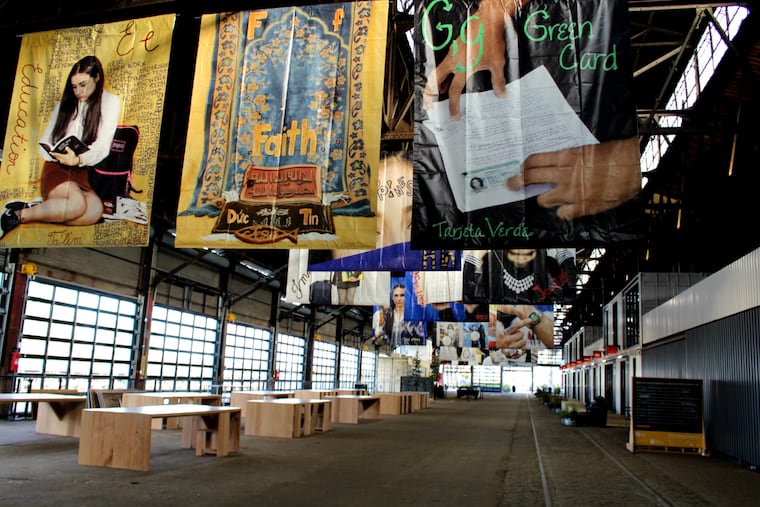Immigrants have long been vital to the arts scene in Philadelphia | Opinion
Immigrant-led organizations such as SEAMAAC, Puentes de Salud, Fleisher Art Memorial, Taller Puertorriqueño, and Al-Bustan are the future of Philadelphia’s culture.

I grew up in Saudi Arabia and Jordan before coming to the United States in 1990. My first exposure to Philadelphia’s culture was through Philly soul — that mellifluous, alluring music — which I listened to on English language radio. As I cultivated a taste for soul in my teens, I learned that although many of the acts associated with Philly soul were Philadelphian, some, such as the O’Jays and the Spinners, were not. In fact, one leading exponent of Philly soul, Thom Bell, was a Jamaican immigrant. As I developed into a cinephile, I noted that M. Night Shyamalan, the Indian American filmmaker raised just outside Philadelphia — the city he so vividly depicted in the 1999 film The Sixth Sense — was an immigrant as well.
As a recent transplant to Philadelphia, I am struck by the vitality of the immigrant community in our city, manifest in path-forging organizations such as SEAMAAC, Puentes de Salud, Fleisher Art Memorial, and Taller Puertorriqueño. As the director Al-Bustan Seeds of Culture, a local arts organization that promotes and produces Arab arts, I recognize that this moment in our city’s history unique. We have the opportunity to enhance Philadelphia’s renown and cultural significance by empowering our city’s immigrant population to take on leadership roles in its creative life.
The opportunity is one created by calamity, namely the COVID-19 pandemic, which disrupted the arts. Philadelphia can emerge from the pandemic with outstanding performances and presentations. We could and should rival New York City — if not in magnitude then in impact. Arts organizations run by and serving BIPOC, immigrant, and refugee communities should not be considered merely as an additional flavor in predominantly white stew.
Since moving from Los Angeles to Philadelphia to join Al-Bustan in late 2020, I have made it my goal to empower non-European Philadelphia arts and culture organizations. I hope that funding initiatives by stalwart foundations such as the Pew Center for Arts and Heritage, PNC Arts Alive, the William Penn Foundation, and others do not dry up before we have proven our worthiness.
» READ MORE: Philly’s ‘Immigrant Alphabet’ finds a new home at Cherry Street Pier
Immigrant communities are resourceful. We are poised to make the most of such largesse, and of the broad transition from physical to online engagement. So many immigrants have, by virtue of their life experience, developed connections in regions far and wide. This is an asset.
During the pandemic, shifting to remote programming of arts events has meant that the physical location of the event isn’t as important as it once was. Moreover, I would argue that cultural significance assumed to engender in a performance or a presentation taking place in New York or a Los Angeles is no longer as palpable — which is leading those who could have opted for those places to choose a different city for reasons other than bragging rights.
On Friday, Al-Bustan is hosting the North American premiere of the highly anticipated and admired Canadian-Lebanese-French movie Memory Box. I doubt that Memory Box would have premiered in Philadelphia had it been released before COVID; rather it would have premiered in New York, Los Angeles, Palm Springs, or Telluride.
“If COVID is the ashes, then Philadelphia is primed to rise to claim its rightful place as a leading cultural center.”
Joseph Fahim, curator of Memory Box’s premiere here and a regular collaborator with Al-Bustan, has observed that as the theatrical market for international films has shrunk in the United States since the pandemic’s onset, opportunities to showcase specific films have diminished.
International titles, including Arab movies, have received little targeted attention before becoming available on streaming services, depriving filmmakers of the intimacy of exchanging with audiences who took more effort than it takes to push a button to watch their films. Philadelphia promises a location for respectful, thoughtful exchanges between audiences and artists who demand to see faces, to hear gasps, and to take uncomfortable questions from people in the same room.
If COVID is the ashes, then Philadelphia is primed to rise to claim its rightful place as a leading cultural center — one that recognizes the inherent capacity of immigrant peoples to reimagine and re-stage its cultural productions and engagements. Artists of diverse backgrounds will then long to come to Philadelphia for an inspiring visit, or a generative residency, or even permanent residence.
Mohannad Ghawanmeh is the executive director of Al-Bustan Seeds of Culture.